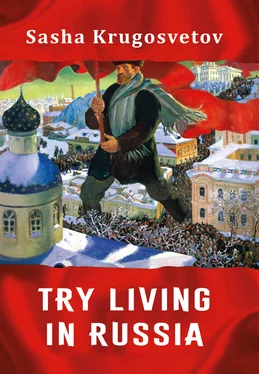Sasha Krugosvetov - Try living in Russia
Здесь есть возможность читать онлайн «Sasha Krugosvetov - Try living in Russia» — ознакомительный отрывок электронной книги совершенно бесплатно, а после прочтения отрывка купить полную версию. В некоторых случаях можно слушать аудио, скачать через торрент в формате fb2 и присутствует краткое содержание. Город: Moscow, Год выпуска: 2020, ISBN: 2020, Жанр: russian_contemporary, на английском языке. Описание произведения, (предисловие) а так же отзывы посетителей доступны на портале библиотеки ЛибКат.
- Название:Try living in Russia
- Автор:
- Жанр:
- Год:2020
- Город:Moscow
- ISBN:978-5-00153-035-0
- Рейтинг книги:3 / 5. Голосов: 1
-
Избранное:Добавить в избранное
- Отзывы:
-
Ваша оценка:
- 60
- 1
- 2
- 3
- 4
- 5
Try living in Russia: краткое содержание, описание и аннотация
Предлагаем к чтению аннотацию, описание, краткое содержание или предисловие (зависит от того, что написал сам автор книги «Try living in Russia»). Если вы не нашли необходимую информацию о книге — напишите в комментариях, мы постараемся отыскать её.
Try living in Russia — читать онлайн ознакомительный отрывок
Ниже представлен текст книги, разбитый по страницам. Система сохранения места последней прочитанной страницы, позволяет с удобством читать онлайн бесплатно книгу «Try living in Russia», без необходимости каждый раз заново искать на чём Вы остановились. Поставьте закладку, и сможете в любой момент перейти на страницу, на которой закончили чтение.
Интервал:
Закладка:
Misha's dream had come true. He was a student at one of the country's best naval institutes. Well-built, smart, sinewy. The uniform fitted him perfectly. As if he'd been wearing a sailor's cap all his life. Joyful and mischievous. A brilliant storyteller. A master at various tricks and pranks. Prepared to do everything for his friends. To give his last shirt. Misha was popular straight away and became part of the inner circle of those who were lording it over the others. The centre of their friendship group was Volodya Maslov, naturally. He was older than the others and had been at the front. Later he had been a commander of the Pacific Fleer. The others were… friends. No friends were closer than them. Friends for life. Friends to the grave. The fleet and his friends. These were the most important things to Misha. More important than wife and children. The sailors' brotherhood was the highest thing.
He came home on a visit. Friends and neighbours came to have a look at the naval student. The girls would whisper to each other: «Did you see? How handsome Misha has become!» His parents were proud. His father loved seeing him in uniform. Vovka also came home on a visit. Infantry! A good-for-nothing and a scoffer. Sailors were the military elite. Vova was preparing for a rendezvous. Too embarrassed to buy condoms. Don't be shy, Vova. Misha went into the pharmacy. «Miss! There's a young man here, he needs condoms. Choose a fashionable style for him. They must have a black heel!» The salesgirls giggled, charmed by the dashing student. Vova was so embarrassed that he wished for the earth to swallow him up.
Misha loved witticisms, and he loved to make an impression. During the exam on the high bar – «I'll show you how to do turns!» One turn, another, a third… he lost his grip, flew into the rows of seats and broke his arm.
1950. The fourth, final year of study. They were due to graduate soon. A sailor needs to have a family. I'll only marry a girl who was born on the same day as me. Well, Mishka, you tell them. That way you'll never find a wife. Girls would come to the Institute to join the Frunze students at their dances. They'd buy a ticket and enter. To dance. To meet young sailors. Three pretty friends turned up. Wearing felt boots. They took off the felt boots and put on shoes. Misha approached them. But what were these two youngsters from year two doing here? He was almost a graduate, a fourth-year student. He whispered to them: «Well, rookies, quietly, I haven't seen you here». The second years were gone in a flash. Mishka carried three pairs of felt boots and three coats to the cloak room. One of the friends was Vera. An unassuming beauty, two years Misha's junior. She was wearing huge shoulder pads under her dress in accordance with the fashion of those days. Misha swept her off her feet, the quiet Vera, who was simple and unpretentious despite living in Leningrad. The sailors could have Sundays off if they had finished all their work. Misha was a good student, and so the two young people would meet once a week. Vera had no telephone at home. They would write letters to each other. The post worked well in those days, not like today. Vera would sign her letters «your mischievous Vera».
Vera was mischievous yet meek. Misha wrote to Tanya, his favourite aunt, that he planned to get married in a few months time. His parents still didn't know a thing. Vera was about to finish technical college. In spring she was due to go to Petrozavodsk on an assignment. Naturally she didn't want to go. And Mishka was a dashing sailor, incredibly handsome, about to become an officer. The first man she had kissed. Of course he was not to her taste. She would have preferred a more sedate, serious guy. This one was… such an idle talker. On the other hand, she didn't want to go to Petrozavodsk. Later, when she was old, Vera confessed to her daughter: «I wasn't the wife Misha needed. He should have found a light-hearted, cheerful woman, not one like me.» They went and got married. Two couples, Mikhail and Vera and a friend of his from the Institute with his girlfriend. Mikhail and Vera handed over their passports. And gasped – they were born on the same day. That's Mishka for you. As if he'd known. It is possible that there had been no such conversations beforehand, that he hadn't foreseen anything. Mishka was a master at spinning a yarn, a practical joker. Perhaps he made this story up after he got married and told it so many times that in the end everybody believed it. There is a reason why people say «make sure to uphold your image, use every opportunity to warm up interest for the reputation you've acquired.»
How to celebrate the wedding? They didn't celebrate at all. Where could he have taken his young wife? Not to the room she shared with her mother and sister after all. Dusya, who wasn't even 50 yet, had become old before her time. She was huge and gloomy, her grey hair covered by a scarf as worn by country women. The newlyweds had nowhere to go. They strolled along the embankments and went each their own way. Vera returned home and Mishka to the Institute. They didn't even feel that they were husband and wife now. Nothing had changed in their lives. Mishka the student was sent on a training voyage for three months. Afterwards he went to Liepaja to begin service. Together with his young wife. Now a lieutenant, he received a room to himself. And went off on a voyage again. Thus they lived an unreal life. In some sense they were husband and wife, but they were hardly ever together. After a year they had a daughter. Then came service in the North.
Misha loved his young wife. But his naval service he loved even more. He loved the sea, his submarine, the prolongued autonomous voyages, his sailors and officers. He quickly rose through the ranks and became an officer early in life. The crew idolised him. He was generous, attentive and prudent. There was order on his boat; the boat was always in good standing. The firing exercises were all flawless. Once the big brass came to inspect the ship. No blame found with the ship's management. What about physical training? Let's start with the commander, Mikhail suggested. Without taking off his tunic, he stepped towards the high bar and did 20 chin-ups. OK, OK, 'pass' for the entire crew. The young commander was considered one of the best belayers in the North. When he was at home, he was often called to make fast other vessels during the night or in bad weather. Sailing was his vocation, no doubt. But his tongue did him no favours. He loved to make up ditties and jokes that made fun of the high brass. This did evidently not help his progress through the ranks. But everybody loved him. He was a master of nautical tales. Later, much later, he became closely acquainted with Viktor Konetsky, the author of «Between Myths and Reefs», stories about Barracuda the Cat. People say that many topics from Mikhail's oral tales later found entry into Konetsky's stories. I don't know whether this is true, but I had the chance to hear Misha's tales. They always kept his audience riveted. Naval romanticism. We'll talk about that later.
How to become a Cosmopolitan
In 1949 there was the Leningrad Case, the straggle against the cosmopolitans; in 1951 the Minister for State Security, Abakumov, was arrested on a charge of organising a large-scale «nationalist Jewish conspiracy». In 1951 and 1952 there was the Doctors' Plot, directed against those looking after the health of the country's top brass. They were searching for cosmopolitans everywhere. It looks like my father ended up in this group in 1951 on his own initiative, at least partly. You see, he was a man of principle. The leadership were committing some kind of abuse. Somewhere they were doing something for their own profit. And he criticised this, naturally. What should those poor sods have done? They began to show interest in my father's work. He was in charge of the staff. It was him who chose people to work on new building sites. He would visit these building sites and organise the huts for the new workers to live in, sort out social matters. It turned out he'd sorted them out badly. That he had enabled «staff pollution». There really was such a term. He had hired a certain Movshovich. A cosmopolitan, that goes without saying. An enemy of the public. Nothing happened to this Movshovich. But my father was excluded from the party. A few days later he was fired from his job. He went to the regional committee. Tried to show them he was right. «Don't you know», the secretary of the regional committee said to him, «that the European part of the Soviet Union is no place for people of your nationality? They are preparing some territories in the Far East for you. Perhaps even further away. We don't understand what it is you're unhappy about.» My father wrote letters. To the district committee, to the Central Committee. He wrote about his military feats. He wrote to Comrade Stalin in person. It did no good. We expected them to arrest him. Any day now. When you could hear brakes screeching outside at night, my mother would rash to the window. Were the «visitors» coming to us? The light would come on in many windows at once. People were looking who they'd come for. The black police car didn't come. But we had to live. Nobody wanted to hire my father. My mother taught him to draw. She hoped to find him a job as a draughtsman. My father was good at drawing. He produced wonderful graphic script. We still have some sheets on which he practiced his letters. This is what he wrote: «The Party is always right. The Party must cleanse itself. The Party must strengthen its ranks. If you hew trees chips must fly. Each case may contain errors.» He couldn't get his head round the screaming injustice and baseness of what was happening.
Читать дальшеИнтервал:
Закладка:
Похожие книги на «Try living in Russia»
Представляем Вашему вниманию похожие книги на «Try living in Russia» списком для выбора. Мы отобрали схожую по названию и смыслу литературу в надежде предоставить читателям больше вариантов отыскать новые, интересные, ещё непрочитанные произведения.
Обсуждение, отзывы о книге «Try living in Russia» и просто собственные мнения читателей. Оставьте ваши комментарии, напишите, что Вы думаете о произведении, его смысле или главных героях. Укажите что конкретно понравилось, а что нет, и почему Вы так считаете.












